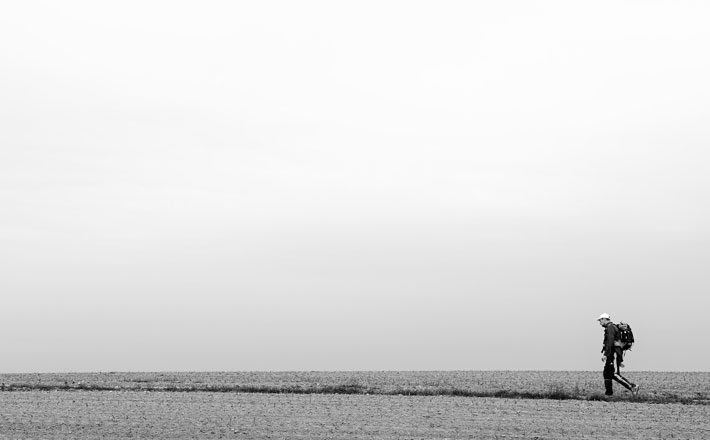Commentary on 2 Corinthians 12:2-10
Paul is in a bit of a pickle.
He is competing with a rival group of missionaries for the respect of the Corinthian church. If Paul is to be believed — and in matters of his reputation and that of others with whom he struggles we should always be suspicious — the rival missionaries were violent, arrogant, moralistic, and power hungry. In 2 Corinthians 11:12-21 Paul paints their portrait. There in mock admiration he names them “super-apostles” (2 Corinthians 11:5).
One stream of Pauline scholarship has in recent years emphasized their similarity with the numerous but fairly uniform accounts of the Cynic philosophers in ancient literature. Cynics (the name refers to dogs) were noted for their hyper-moralism and their use of free speech to condemn the vices of others and to exhibit their own independence. They bark (warn) and they bite (sharply criticize). Many Cynics, not all to be sure, were downright nasty and mean.
That Paul draws upon popular stereotypes of Cynic philosophers to describe his opponents opens 2 Corinthians 12:1-10 to some interesting interpretive possibilities. Paul has gotten himself into a boasting contest in which he seeks to criticize his opponents’ boasting of strength by boasting of his own weakness. Now, you might question whether it is ever a good idea to fight fire with fire, that is, whether it was wise for Paul to boast at all.
Agreed, if you want to criticize your opponents for boasting it is not a good idea to start boasting yourself. Unless you boast not in your strength or power, as the rivals did, but in your weakness as Paul does. Furthermore, it is not quite accurate to say, as I just said, that Paul simply wanted to criticize his opponents. There is of course some of that going on, but I think the stakes are higher than that. The contrast he draws between his opponents’ power and his weakness is about Christ. That is, about his weakness and power.
I believe this whole passage depends on the way we conceptualize “weakness” (astheneia) and how Paul’s weakness dissolves what we usually take to be Christ’s power. The traditional interpretation is to think of weakness as the inability to do something, and that is certainly not an impossible reading of the word. But there is another interpretation that may be more relevant to Paul’s use of astheneia in this passage.
In reference to bodies (of all kinds, not just the human variety) the root sthen indicates a holding together or cohesion. To be strong means to be self-contained and self-identical, even as the world is falling apart around you. Astheneia, on the other hand, means coming undone. It frequently referred to sickness and disease, but it also points, in a more general sense, to what we know about but can’t quite define: “human weakness,” which might be thought of as the failure of resolve or the lack of fortitude in the face of despair.
It’s the weakness that resides in our mortality or in the weakness we feel in ourselves as we contemplate a beloved’s mortality. Or it is the weakness we experience when we remember an intimacy, perhaps never to be repeated, that is beyond words to express and in fact forbidden by love itself to express to anyone other than to the beloved (2 Corinthians 12:4). But that intimacy is locked in the past. To desire it again is to be weak.
So when Paul confesses in 2 Corinthians 12:5 that he only boasts in his weaknesses, he says what must have been puzzling to his readers and utterly unintelligible to the super-apostles had they ever gotten their hands on this text. He boasts in his coming undone.
And when “the Lord” in 2 Corinthians 12:9 replies to Paul’s prayer saying “for power (“my” is a possible but unlikely textual variant) is perfected in astheneia,” this response does not mean that the Lord demonstrates the Lord’s power by having the lowly and incapable Paul demonstrating vividly the huge gap between divine and human power. Rather, a new definition of “power” is in formation, one that prefers to believe that there is strength in falling apart, a strength without strength in the weakness that is non-self-identity — to express the idea in the terms of post-structuralist philosophy. Or to say it in way I can almost understand: power is made perfect in loving.
But what does loving another do to you? In what way does it entail weakness? Since the time of Sappho (7th century BCE) that is the question love poetry has asked. The answer has come in the form of goads, arrows, thorns, anything sharp enough to pierce the skin, infect the body with burning desire, and inflame the soul as we see in these lines from Musaeus’ magnificent and sorrowful poem of the 6th century CE, Hero and Leander:
But you, dread-suffering Leander, when you saw
the glorious girl,
You had no will to consume your heart with secret
goadings,
But vanquished, all unlooked-for, by the fire-smitten
arrows
You had no will to live in loss of lovely Hero.
Under the glance of her eyes, love’s firebrand grew
fiercer
And your heart seethed at the charge of indomitable
fire —
For the far-renowned beauty of woman without flaw
Comes to mortal men keener than a winged arrow… (lines 86-93; Loeb Classical Library)
Both medieval mystical writers (Marguerite Porete, for example) and commentators on Song of Songs (John of Ford, for example), though presumably never having read a line of Musaeus, just assumed Paul’s passion for Christ (and their own desire) was not so very different from what we read in Leander’s passion for Hero. John doesn’t think twice about identifying Paul’s thorn in the flesh with his frustrated and therefore enfeebling desire to draw close to the beloved. This, then, is Paul’s weakness, which is the perfection of power in Christ’s eyes, and the topic of his boasting. So who do you think won the boasting conquest?


July 8, 2018